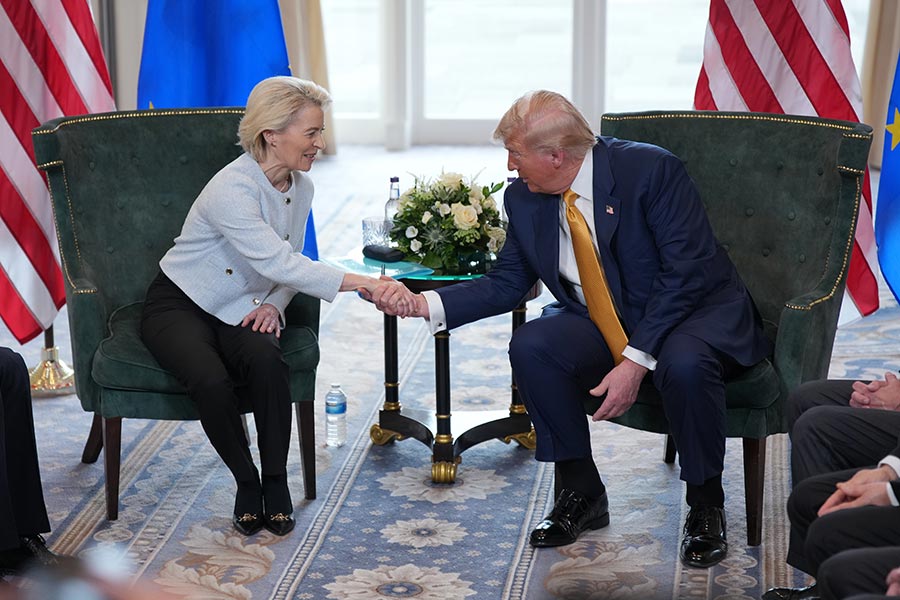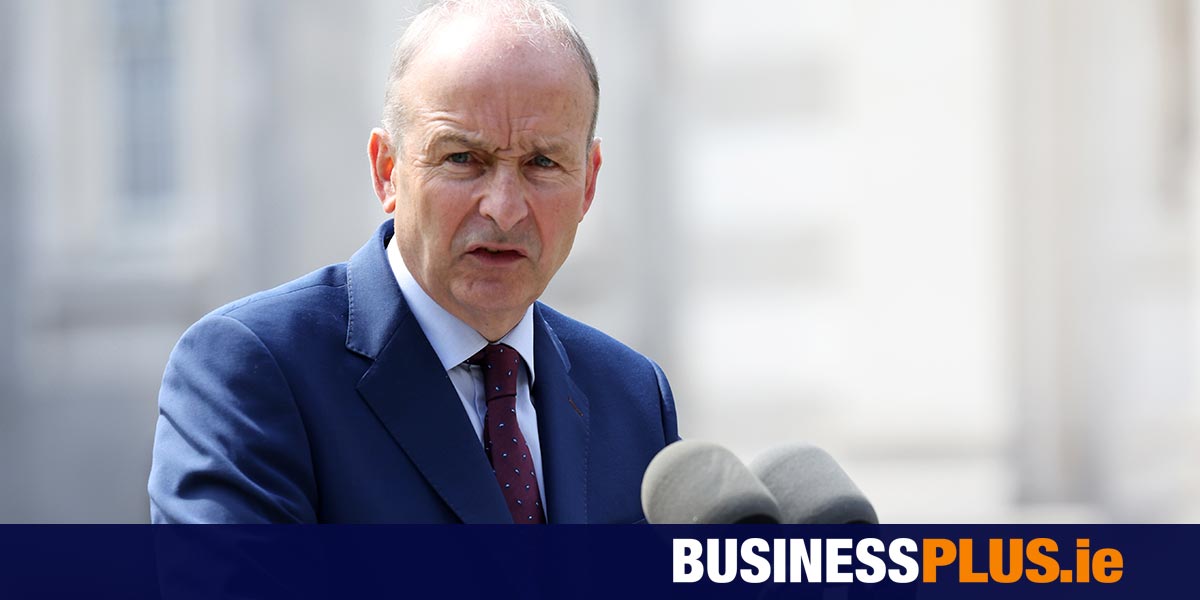Taoiseach Micheál Martin has ruled out Brexit-style support for businesses – and denied the EU capitulated to Donald Trump’s trade war threats, writes Brian Mahon.
This came after Hungarian leader Viktor Orban said Mr Trump ate Commission president Ursula von der Leyen “for breakfast” and French minister Benjamin Haddad called the deal “unbalanced”.
A senior Cabinet minister said the Government’s current expenditure will be the target for any tariff-related cuts, once it assesses the effect of the 15% US tariffs on EU goods.
Mr Martin said yesterday no one is welcoming a baseline tariff of 15% “with open arms” but the EU-US agreement had avoided a “ruinous” trade war.
Asked if Brexit-style supports for businesses would now be implemented to deal with the 15% tariff, Mr Martin said: “This is not Brexit, and I would caution in terms of just creating funds in themselves.
“I think, more importantly, we have to take decisions now that would create the opportunity, or the landscape, for companies to grow and to develop strongly.”
The Taoiseach also said the deal offered “overall ceilings” on tariff rates and would mean they are not “stacked” upon another.
Despite alternative suggestions from Mr Trump, Mr Martin said his understanding was the 15% on pharma exports also represented “a ceiling” rate.
The effects that the tariffs would have on October’s budget would be decided closer to the time, the Taoiseach said.
“It’s important to say that Europe never sought tariffs, or never sought to impose tariffs, and fundamentally, we are against tariffs: we believe in an open trading economy,” he added.
He said the deal will bring stability to patients “when it comes to the manufacturing and distribution of medicines”.
“In essence, we have avoided a trade conflict here which would have been ruinous, which would have been very damaging to our economy, and to jobs in particular.
“The challenge now for Europe is to work on its own inefficiencies, to reduce barriers within the single market, to press ahead more ambitiously and more proactively on trade diversification and trade deals with other countries that would facilitate that market diversification that is required.
“Meanwhile, there is much to be negotiated in the aftermath of this framework agreement.”
Meanwhile, a senior Cabinet source said that they trusted Trump to honour the deal that was struck with the EU over the weekend, saying he needed to provide stability to the US economy.
They also acknowledged that, if Ireland has to introduce cuts, it will be done to current spending and not on proposed tax cuts or on investment in infrastructure.
The minister said: “There are multiple moving parts. There’s a whole load of moving variables that we’re not yet informed upon.”
“One element to that is the investment plan, that isn’t going to change. The tax side is still relatively moderate, so I think that’s unlikely to change as well,” they added.
They also confirmed that the 9% VAT rate is not going to be implemented from January 1 next year and is likely to be implemented from later in the year to allow for income tax changes to be priced into the Budget.
“And then, really, it’s just a case of how we model current expenditure, and I suppose that will be informed by growth.
“That’ll be informed by the broader analysis, which is done over the next number of weeks.
“But, it’s too early to say, until we know the bottom out the actual sectoral piece,” they said in reference to how the pharmaceutical and other sectors would be impacted by the tariffs.
As part of the deal the EU is to have 15% tariffs imposed on most of its goods – including cars, semiconductors and pharmaceuticals – entering the US.
There will be “zero for zero” tariffs applied on some products including aircraft, some agricultural goods and certain chemicals.
On top of that, the EU will purchase €750bn of US energy.
Asked about mixed reactions to the deal from heads of government across Europe, Mr Martin said: “It’s easy to put the chin out in life, but sometimes it’s wiser to box more cautiously and to negotiate wisely… and to think of the bigger picture.
“It’s difficult at this early stage to calculate the impact of these tariffs in terms of government revenues, or indeed in terms of the prospects for 2026, so we will do further analysis of that.”
The Taoiseach said he did not believe Irish companies would lose access to the US market as a result of the tariff rate.
Responding, the chief executive of business group Ibec, Danny McCoy, said he believed Europe had “capitulated” to get a deal, but said if they had negotiated harder “we could have damaged ourselves a lot more than we anticipated”.
 President of the European Commission Ursula von der Leyen shakes hands with U.S. President Donald Trump. (Photo by Andrew Harnik/Getty Images)
President of the European Commission Ursula von der Leyen shakes hands with U.S. President Donald Trump. (Photo by Andrew Harnik/Getty Images)
He said there would be “hard cases” and job losses in Ireland under a 15% tariff, and was “surprised” the Government was not open to Brexit or Covid-level supports for businesses.
“It’s not going to be a catastrophe, we’re more resistant than that, but for some industries, going back to the point around the Brexit-type adjustment fund, you need to be sensitive.
“There will be some areas that actually could find this devastating,” he added.
